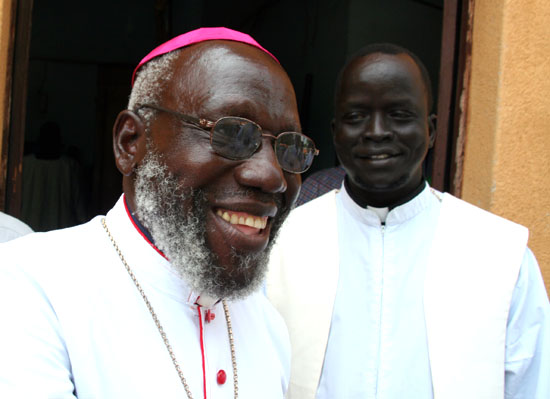South Sudan bishop wins international peace award

U.N. Secretary-General Ban Ki-moon is to present the 2013 Sergio Vieira de Mello Prize to South Sudan's Bishop Emeritus Paride Taban for his work in helping different groups in his new country live together in harmony.
"Because this is the 10th anniversary of the tragic death of Sergio de Mello in Iraq, the annual lecture commemorating him and the prize named after him will be presented by the U.N. Secretary-General," Anne Willem Bijleveld, chair of the foundation named after De Mello told Ecumenical News on Friday.
Ban will present the award and a lecture on March 1 in Geneva.
Landlocked South Sudan is the world's youngest nation, getting its independence from its northern neighbor Sudan in 2011. Conflicts between the two nations have flared periodically since then, sometimes triggered by disputed oil fields.
Islam is predominant in Sudan, while South Sudanese are mostly Christians or follow traditional African forms of worship.
Taban was Roman Catholic bishop of the diocese of Torit until 2004 and he has urged his fledgling country's leaders to be open to criticism.
"I have spent many years searching for peace," Bishop Taban quoted by the foundation saying about his country and Sudan, torn by decades of ethnic and religious violence.
"I have been dreaming of a community where people with different ethnicity and different religious backgrounds can live side by side with confidence in harmony and fellowship. I hope to make Sudan a nation where people live as brothers and sisters."
Part of Bisop Taban's dream came true he created in 2005 what he calls a "small oasis of peace" in Kuron, Eastern Equatoria State of South Sudan where people coming from different tribes and who have been in conflict with one another over cattle rustling, now live in peace.
"People also came from the borders of Ethiopia, Kenya and Uganda, where people raided cattle and called each other enemies," Bishop Taban has said. "Now, these people call each other brothers.
"There was a hospital on the route between Kenya and Juba where people could not go for medical treatment because of cattle raiding. It was difficult for people from one tribe to cross that area. The other tribe would take them to kill them. Now, this has ended."
Now he says that in this village, people from different faiths, Muslims and Christians, including Catholics, Pentecostals, and Adventists, live peacefully together.
The jury for the Sergio Vieira de Mello Award presented its first prize to the Al Mesalla Center for Human Resources Development the work of the Iraqi non-governmental organization in reconciling differences in Iraq.
The prize, selected by a jury of international representatives, is awarded every two years. The lecture is given every year.
De Mello was a Brazilian United Nations employee for more than 34 years. He earned international respect around the world for his efforts in U.N. humanitarian and political programs.
Before his death, many leaders touted him as a likely candidate for U.N. Secretary-General.
He was killed in the Baghdad's Canal Hotel Bombing along with 20 other members of his staff on Aug. 18, 2003 while working as the Secretary-General's Special Representative in Iraq.